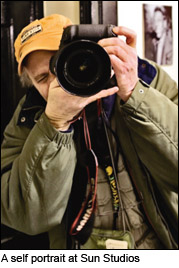 Take a look at a map of the US; Memphis, TN is located in the heart of a tristate area where Tennessee, Mississippi and Arkansas meet. This centralized location made Memphis the melting pot of the mid-South and was the reason why so many musicians ended up there (I consider it to be the “Ellis Island” of the South). Musicians emigrated from places like Indianola, Clarksdale, Tupelo, Jackson and Greenwood (all in Mississippi) and Little Rock and Helena (in Arkansas) to name but a few. The music encompassed country, blues, rockabilly, rock ‘n’ roll, gospel and rhythm and blues, a veritable “melting pot” of styles. Memphis gave musicians freedom, a place to showcase their talents and ultimately a way out, which was the road north (to Chicago, etc.).
Take a look at a map of the US; Memphis, TN is located in the heart of a tristate area where Tennessee, Mississippi and Arkansas meet. This centralized location made Memphis the melting pot of the mid-South and was the reason why so many musicians ended up there (I consider it to be the “Ellis Island” of the South). Musicians emigrated from places like Indianola, Clarksdale, Tupelo, Jackson and Greenwood (all in Mississippi) and Little Rock and Helena (in Arkansas) to name but a few. The music encompassed country, blues, rockabilly, rock ‘n’ roll, gospel and rhythm and blues, a veritable “melting pot” of styles. Memphis gave musicians freedom, a place to showcase their talents and ultimately a way out, which was the road north (to Chicago, etc.).
Memphis also produced some of the legendary record labels including Goldwax, Hi, Fernwood, Sun, Stax and Meteor. These labels opened the door for artists like Elvis, Howlin’ Wolf, Rosco Gordon, Johnny Cash, Otis Redding and Isaac Hayes to become international icons. The city itself was thriving and not only set the style for music but for fashion as well (the clothing store Lansky outfi tted Elvis and many other influential Memphis artists). In the 1960s things started to come to an end, and the final dagger was struck April 2, 1968, the day Martin Luther King was assassinated in Memphis.
My first trip to Memphis was in the mid-’70s, a time when there was not much left of the historic city to see. Beale Street was dead, Sun Studios was no longer in business and even the landmark Peabody Hotel was gone. Memphis’ comeback started in 1977 when Beale Street was officially declared “Home of the Blues” by an act of Congress. The economic revitalization did not follow until the 1980s, and today the Memphis area has become a real destination point. Beale Street has been totally revived (its clubs play host to the International Blues Challenge), Stax has been rebuilt on the original spot and Sun is operational again. Downtown Memphis has become bigger and better than ever with the Gibson Guitar Factory, Civil Rights Museum, Center for Southern Folklore, Rock ‘n’ Soul Museum, National Blues Foundation and the Memphis in May Music Festival. There have even been improvements made to the cornerstone of Memphis, Graceland.
Other big changes have occurred in the surrounding areas. Actor Morgan Freeman opened his blues club, Ground Zero, first in Clarksdale, Mississippi and later in Memphis. The Arkansas Blues and Heritage Festival (formerly King Biscuit) in Helena, Arkansas attracts major blues artists and fans from all over the world. Renewed interest in the Delta has led to the opening of the Delta Blues Museum, the Mississippi Blues Trail and the B.B. King Museum. Yes, the area has come a long way from the days when John Lee Hooker called Mississippi “the worst state in the union.” Anybody into American history, music and the best BBQ on the planet should make their way to the Memphis “tri-state area.”
—Arnie Goodman



Be the first to comment!